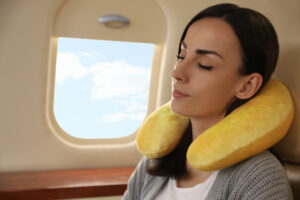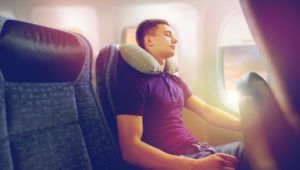How to Sleep on a Plane
Most people who travel by plane, whether for business or pleasure, prefer to arrive at their destinations feeling well-rested. But the upright position of an airplane seat is just one factor that can make it difficult to get high-quality sleep. Plane noise, light, turbulence, and cabin air all make sleeping on a plane more challenging than sleeping at home.
Knowing some strategies for sleeping on board a plane, as well as the steps to take ahead of a flight, can help travelers get the best sleep possible.
Tips for Sleeping on a Plane
To get better sleep on a plane, find ways to shut out noise, light, and other distractions, while making sure not to overtax your body. You can take several measures to help you get the sleep you need.
- Wear an eye mask: Excess light can make sleeping difficult. A sleep mask can help to block out light from windows or overhead lights that might keep you awake.
- Use headphones or earplugs: Ear plugs or noise canceling headphones can block out the noise from other passengers and the aircraft itself. Playing music through your headphones may also help you relax and get better sleep, in addition to blocking out external sound.
- Bring a pillow and extra layers: Travel pillows can help support your neck while you sleep on a plane. And having a sweater or blanket with you will help keep you warm in a cool airplane cabin.
- Drink plenty of water: Breathing the dry, recirculated air in an airplane cabin can make you dehydrated . Staying hydrated on the plane will help you avoid the uncomfortable symptoms of dehydration that could keep you awake. But be careful not to overdo it, or you may have to get up to use the bathroom too often.
- Avoid heavy foods: Digesting a big meal makes it hard for the body to get quality sleep. When you want to sleep on your next flight, try eating light snacks instead.
- Skip alcoholic beverages: Consuming alcohol can disrupt your sleep and affect your nighttime breathing. Avoid having a nightcap before trying to sleep on a plane.
- Recline your chair as much as possible: Research has found that sitting upright increases alertness . The more you are able to recline your chair, the more it may benefit your sleep.
- Try meditation: Meditating by concentrating on your breathing or focusing on a thought or visualization can help you relax on the plane and ease your way into sleep.

Sleeping on a Plane if You Snore
Snoring occurs when the muscles at the back of the throat relax during sleep, which narrows the airway. Breathing through a narrowed airway can make the soft tissues in the throat flutter, causing the sound of snoring.
Snoring on a crowded plane can be embarrassing, so it is understandable to want to minimize snoring during a flight. Luckily, you can take a few steps to reduce snoring on a plane.
- Sleep upright: Elevating the head while sleeping can alleviate snoring. Conveniently, sleeping in an upright airplane seat might reduce the amount you snore, compared to when you are lying flat.
- Cut back on alcohol and nicotine: Drinking alcohol and smoking tobacco increase the chances of snoring, so consider abstaining from both before the flight and foregoing any alcohol while in the air.
- Carry a preventative oral appliance: Specialized mouthpieces and mouthguards can open up the airway to reduce snoring. Your dentist may be able to recommend a mouthpiece or fit you for a custom device.
- Address congestion: If nasal congestion or sinus inflammation is making you snore, nasal strips or decongestants might prevent snoring while asleep on the flight.
What to Do Before Your Flight
When planning a trip, keep your sleep schedule in mind. Although it is not always easy, try to avoid booking early or late flights that will cut into your normal sleeping hours. This way, you will not need to sleep on the plane.
Choosing the right seat on the plane can also improve your chances of sleeping well. Some sleep experts suggest booking a window seat because it provides a surface to rest your head, which can be more comfortable. Seats near the wings, in the middle of the plane, may also be less bumpy and less likely to disturb your sleep.
As the time of your flight approaches, try to reduce the stress and anxiety related to travel, which can impact the quality of your sleep. Having your travel plans in order well before heading to the airport may lower your anxiety and make it easier to sleep soundly. Exercising is also linked with better sleep, so try getting your body moving before your flight.
Sleep aids like melatonin may help you fall asleep and adjust to time changes. But it is best to consult your doctor for guidance before starting any supplement or medication.

Still have questions? Ask our community!
Join our Sleep Care Community — a trusted hub of sleep health professionals, product specialists, and people just like you. Whether you need expert sleep advice for your insomnia or you’re searching for the perfect mattress, we’ve got you covered. Get personalized guidance from the experts who know sleep best.
References
5 Sources
-
Zubac, D., Buoite Stella, A., & Morrison, S. A. (2020). Up in the Air: Evidence of Dehydration Risk and Long-Haul Flight on Athletic Performance. Nutrients, 12(9), 2574.
https://pubmed.ncbi.nlm.nih.gov/32854320/ -
National Heart, Lung, and Blood Institute. (2011, August). Your guide to healthy sleep., Retrieved April 28, 2023, from
https://www.nhlbi.nih.gov/health-topics/all-publications-and-resources/your-guide-healthy-sleep -
Roach, G. D., Matthews, R., Naweed, A., Kontou, T. G., & Sargent, C. (2018). Flat-out napping: The quantity and quality of sleep obtained in a seat during the daytime increase as the angle of recline of the seat increases. Chronobiology international, 35(6), 872–883.
https://www.tandfonline.com/doi/full/10.1080/07420528.2018.1466801 -
Schwab, R. J. (2022, May). Snoring. Merck Manual Professional Version., Retrieved April 28, 2023, from
https://www.merckmanuals.com/en-pr/professional/neurologic-disorders/sleep-and-wakefulness-disorders/snoring -
Rowley, J. A. (2023, January 6). Snoring in adults. In M. S. Badr (Ed.). UpToDate., Retrieved April 28, 2023, from
https://www.uptodate.com/contents/snoring-in-adults






